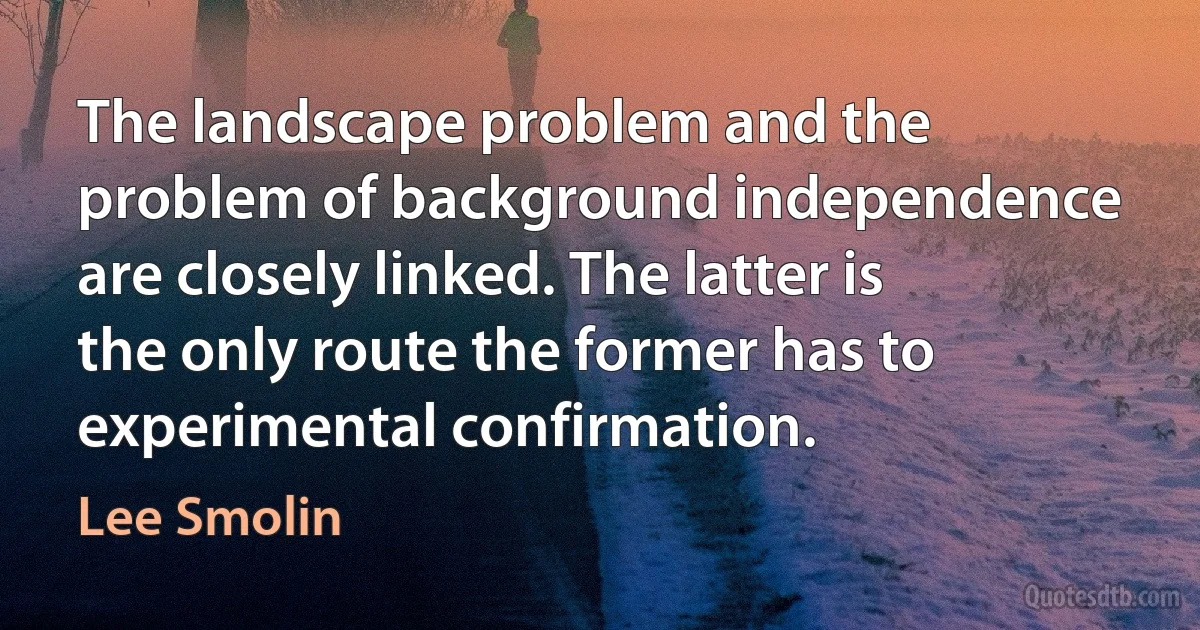Landscape Quotes - page 15
Part of the charm of synthetic organic chemistry derives from the vastness of the intellectual landscape along several dimensions. First, there is the almost infinite variety and number of possible target structures that lurk in the darkness waiting to be made. Then, there is the vast body of organic reactions that serve to transform one substance into another, now so large in number as to be beyond credibility to a non-chemist. There is the staggering range of reagents, reaction conditions, catalysts, elements, and techniques that must be mobilized in order to tame these reactions for synthetic purposes. Finally, it seems that new information is being added to that landscape at a rate that exceeds the ability of a normal person to keep up with it. In such a troubled setting any author, or group of authors, must be regarded as heroic if through their efforts, the task of the synthetic chemist is eased.

Elias James Corey
I might get an idea [for the start of a painting] sitting looking at the river, or something, or a specific.... Yeess. I'm sure, yes, I'm sure it [the environment] influences me in terms of green and gray and color and... I mean, New York light is so different, and it always hits me when I come here [in New York], and it excites me to see great extremes of dark and light and no nuance - which I love. But there the Isle de France [round about Paris] has that, you know, filtered light that is that.. where even on a gray day, the green is very green, and the red is very red.... I think walking out barefoot and moving the paintings, being able to move them out of my studio [in Vetheuil] for transportation, things like that have had [influence]... As well as the landscape. Lake Michigan was pretty important, you know.

Joan Mitchell
In all there are four arguments here for the multiverse: the failure of conventional methods for understanding why the cosmological constant is not large, the success of the environmental theories for doing so, the successful prediction of the nonzero cosmological constant, and the string landscape.

Joseph Polchinski
.. my own paintings of that period (1916 – 1919) remain pure still-life compositions and never suggest any metaphysical, surrealist, psychological, or literary considerations at all [reacting on similarities with the art of Carrà, and de Chirico, suggested by the interviewer]. My milliners' dummies, for instance, are objects like others and have not been selected to suggest symbolic representations of human beings of legendary or mythological characters. The only titles that I chose for these paintings were conventional, like 'Still Life, Flowers or Landscape', without any implications of strangeness of an unreal world.

Giorgio Morandi
Wounds on the external landscape exist in the internal landscape first. We re-create those inner wounds on the outside, on the planet. So being a vegan, practicing yoga, and taking time to exercise and do things that nourish my heart and spirit are all vital parts of my "activism.” Activists have done a great job of caring for the world around us, but we haven't done a great job of caring for ourselves and each other. ... If we're going to ask people to open up to the pain of the earth, we ought to have systems in place that enable us to relieve each other's pain.

Julia Butterfly Hill
What makes the Nightmares on Elm Street universal and forever in their attraction, I think, is simply the dream. The landscape of the mind, the subconscious, the nightmare. Everybody has a nightmare, and everybody apparently has falling dreams, and everybody has the drowning dream, and everybody has certain kinds of sexual manifestation dreams, as well as our stress dreams; I didn't study for the algebra test, I didn't study for my driving test, you know, all those dreams. I still have those dreams, and it's just such an interesting thing that our mind can turn against us, our own mind, you know we all have.

Robert Englund
Shall I now ask these palette-slaves what poetry means, and in how many forms it appears to us? They want to chain her [poetry], just as they are tied up themselves to their master's palette, [or] to some part of the sacred history.... to a folktale.... a miraculous landscape.... or other pompous imaginations.

Barend Cornelis Koekkoek
Beforehand I don't make any drawing of the object or objects which I want to paint on the canvas or panel.... but I start directly to situate the designed plan on the canvas - After having thoroughly sketched and thought over my composition, especially the arrangement of light and dark, I start to paint it broadly with oil-paint and try as much as possible to achieve the hue or the colouring, in which I want to see my landscape.... when it is definitely completed.

Barend Cornelis Koekkoek
Why We See Things and Not the Holes Between Them. We can now attempt an answer to the question why we do so. Two of the factors of organization which we have so far discussed seem to me to be the most important causes of this effect. In the first place, the segregation and unification which occurs will separate areas of different degrees of internal articulation, and according to our law, the more highly articulated ones will become figures, the rest fusing together to form the ground. Look at any landscape photograph. You see the shape of the things, the mountains, and trees and buildings, but not of the sky.

Kurt Koffka
It needs but half an eye to see in these latter days that science, the Grand Revelator of modern Western culture, has reached, without having intended to, a frontier. Either it must bury its dead, close its ranks, and go forward into a landscape of increasing strangeness, replete with things shocking to a culture-trammeled understanding, or it must become, in Claude Houghton's expressive phrase, the plagiarist of its own past. The frontier was foreseen in principle very long ago, and given a name that has descended to our day clouded with myth. That name is Babel. For science's long and heroic effort to be strictly factual has at last brought it into entanglement with the unsuspected facts of the linguistic order. These facts the older classical science had never admitted, confronted, or understood as facts. Instead they had entered its house by the back door and had been taken for the substance of Reason itself.

Benjamin Lee Whorf
Ridgway and I climbed a ladder inside the tower to the belfry, spoke to the sergeant observer there, and looked over the landscape on the German side of the river. Then Ridgway turned to the sergeant and at length asked him to put a mortar concentration on a point of woods a few hundred yards away on the German side. The sergeant, unperturbed, cranked his field telephone and spoke to someone at the mortar position in the fields behind the church. "Joe," he said, "remember the dead horse we used as an aiming point yesterday? This target is about fifty over and 100 left. Ten rounds when you're ready." The rounds were in the air almost at once, and their accuracy was impeccable; but I was far from happy about the way my sergeant had shortcut the standard methods of adjusting fire as prescribed in the mortar manual. Although an artilleryman and not the expert on infantry weapons which Ridgway was, I was sure the "dead horse" method of adjustment was not in the book.

Maxwell D. Taylor
It is in a sculptor's interest that there should exist a close relationship between his art and that of the poet. Otherwise, his sculpture may lack human or emotional content and become too strictly architectural. We sculptors pay a heavy price for the limited freedom that we enjoy as a result of our being able to create in three dimensions; we must sacrifice color and whole realms of subject matter, such as landscape, that scarcely lend themselves to a representation in three dimensions.

Ossip Zadkine
Patience! They will come to it gradually! Rousseau has sold a landscape for five hundred francs; for my part, I have sold a view of Fontainebleau for seventy-five francs. And I am commissioned to ask you for companion sketches to your drawings. And this time, instead of twenty francs, they are to pay you twenty-five! (Millet replied resignedly: 'If I could only sell two drawings a week at that price all would go right!

Narcisse Virgilio Díaz
Hugo [Claus], Now you should see my recent works. A drawing in ink, three pencil drawings and two sketches in oil-paint: a still-life and a landscape in the strongest colors you can imagine. I still have to work on the landscape, but I really think it will be the best of my paintings till now.... but the happiest thing is, I have acquired much more freedom.

Roger Raveel
I have a garden and across the road, a park. I never go for walks, but I look out the window and 'ask for permission' [to paint the view] as I call it. If I need some green, I find it there. In that sense, I'm a very old-fashioned painter, tied to nature. But I remain modern in that I execute some rather impious structures. I will react if I feel that my paintings, though abstract, become too naturalistic. I have another studio in Italy and I worked a lot there this summer. I still depend on my surroundings, so some of my work was very influenced by the Italian landscape, its olive trees and the very cold green color of the leaves. You could identify the specific landscape in those paintings and it drove me crazy. So I had to destroy them. But even destruction can still help underline what is good about a picture.

Per Kirkeby
The hypothesis underlying all approaches to the landscape is that there is a cosmological setting in which different regions or epochs of the universe can have different effective laws. This implies the existence of spacetime regions not directly observable... These regions must either be in the past of our big bang, or far enough away from us to be causally unrelated.

Lee Smolin
The landscape problem represents a serious problem in the development of science. Its solution requires... the construction of speculative cosmological scenarios, which posit regions or epochs of our universe for which we presently have no observable evidence. Nonetheless we must insist on taking seriously only scenarios and hypotheses that make falsifiable or strongly verifiable predictions, otherwise people can just make stuff up and the distinction between science and mythology becomes porous. ...there are already candidate solutions that make real, falsifiable predictions.

Lee Smolin
It is the first time in my life that I have not been able to do anything. I am in a bad state of mind and I am demoralized, and that influences me. I have only [made] seven canvases. I am sorry. I wanted to leave Cagnes, this landscape that I cannot endure. I even went for a few days to Cap Martin, where I thought of settling down. It displeased me. I had to rub out the canvases I started... I am in Cagnes again, against my will, where, instead of landscapes, I shall be forced to do some miserable still lifes. You will understand in what a state of indecision I am. Can't you suggest some place for me? Because, several times I have had the intention of returning to Paris.

Chaim Soutine



